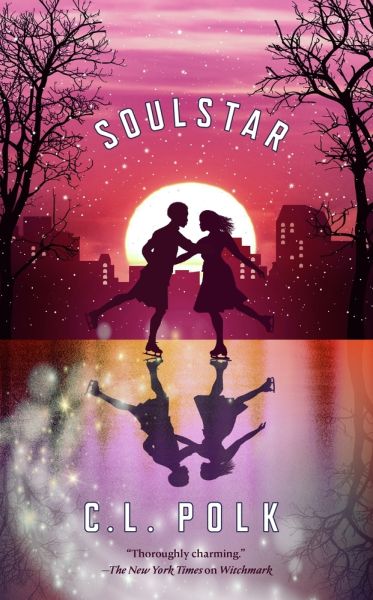End This World of Slavery
Soulstar (Kingston Cycle, volume 3)
By C. L. Polk

8 Jan, 2021
0 comments
2021’s Soulstar is the third book in C. L. Polk’s Kingston Cycle.
Newly crowned King Severin of Aeland inaugurates his ambitious reign by abolishing the misleadingly named Witchcraft Protection Act. Witches will no longer be dragged off to asylums for brutal (often lethal) exploitation and those in asylums will be permitted to leave. All across Aeland, people are reunited with loved ones they had had no hope of ever seeing again. It’s a happy end to a tragic era.
As Robin Thorpe, recently reunited with her witch spouse Zelind, could tell Severin, the situation cannot be resolved with a quick decree.
Closing the asylums means discovering exactly what was going on inside them. They were not merely virtual prisons into which the unwanted could be safely disposed. Some of the asylum inhabitants were valuable economic resources. Since demand often outstripped supply, at least some asylums had sub-rosa breeding programs that forced prisoners to produce gifted children.
There is also the matter of recompense. How one compensates people for mistreatment is a tricky question, particularly when many of the people making decisions don’t care to commit to expensive solutions. After all, the government’s resources are limited. Money wasted trying to make amends is money that cannot go to causes about which real people care.
Underlying cause: while Aeland’s governments have recently had to bend the knee to the Amaranthines1, Aeland does not really have responsible governments. While it has elections, few can afford to run for office. Not many can afford the voting fees. As a consequence, what the masses might like (or need) is of little importance to the ruling classes, who are pretty much the same people who led Aeland into calamity at the beginning of the series.
Nothing for it but that the leaders of the common folk organize! Jacob Clarke sets out to build the case for universal franchise and the popular vote by running a shadow election in which all are permitted to vote. This will have no legal standing, but Jacob and his allies, Robin included, will act as though it did.
Of course, bold schemes like Jacob’s attract pushback from a ruling class which is, recent setbacks aside, perfectly happy with matters as they are. While Jacob, Robin and their allies might have righteousness on their side, the powers that be have the laws and the police.
And if that’s not enough? Well, assassins are not so hard to find.
~oOo~
“I don’t like the results the current voting system produces so we will run our own version and act as though the result has standing” may play a bit differently to US audiences in 2021 than it might have prior to, oh, early November 2020. That said, there’s a fundamental difference between what the pro-democracy forces in this novel are trying to do and what’s going on right now, south of the Canadian border: the efforts here are to extend the franchise rather than erase the majority of the votes cast.
[Hey, remember the old days when someone could write a book review without a coup happening between drafts? I remember it like it was earlier this week.]
One might wonder (given election results from all over the globe) if the masses have the necessary expertise needed to select prudent representatives. In this case, however, the established ruling classes have not just brutally exploited the masses. They have brought Aeland to brink of annihilation on a number of occasions in recent memory. It’s not an impossibility that the popular representatives could be worse than the aristos, but … beating the previous governments’ record would be difficult.
There is a wealth of possible inspirations for the entire recompense subplot but I expect one of them is the eye-catching gap between the fine words some Canadian politicians make about the need to make amends for the Residential Schools [2] and the actions they’ve actually taken. Or have not taken. There is a vast (and if Canadian history is any guide, unbridgeable) gulf between being mildly embarrassed over past offenses and being willing to invest the funds and efforts needed to go beyond vague platitudes.
As one might expect from an author whose previous novel, Midnight Bargain, is on the Canada Reads Long List, Polk makes the reader care about abstract political points by presenting them from the perspective of the people whose lives are shaped by the reality of said policies. Although this is the third book in the series, and thus might be expected to be the conclusion, there’s still lots of progress to be made in Aeland. Ample room for more books in the series, which I for one will read.
Soulstar is available here (Amazon US), here (Amazon Canada), here (Amazon UK), here (Barnes & Noble), here (Book Depository), and here (Chapters-Indigo).
1: The Fae, more or less.
2: Others, of course, are still jolly keen on the basic ideas that led to the Residential Schools. Even lip-service apologies are grudgingly uttered only when the alternative is more negative press than is tolerable. In such people’s defense, they’re awful people.
